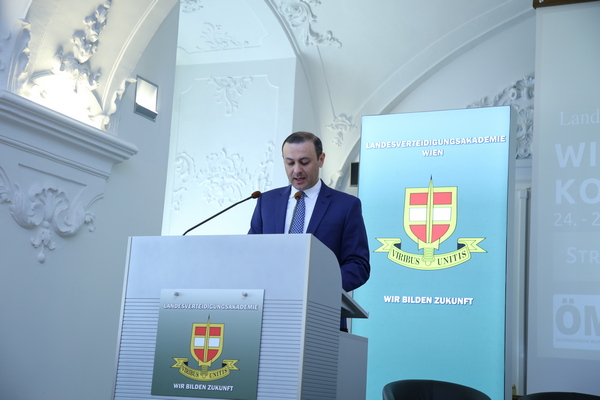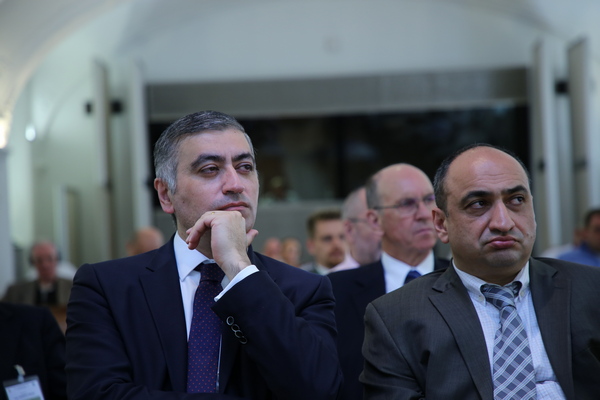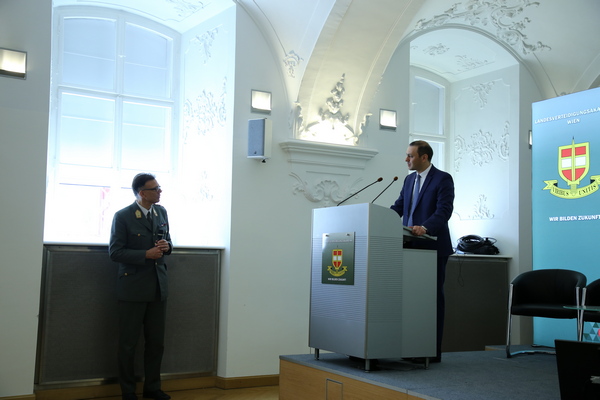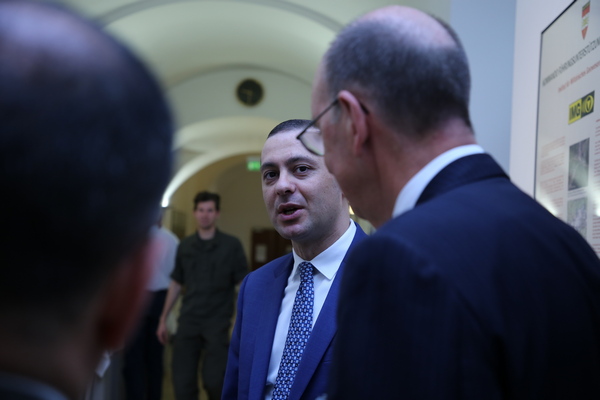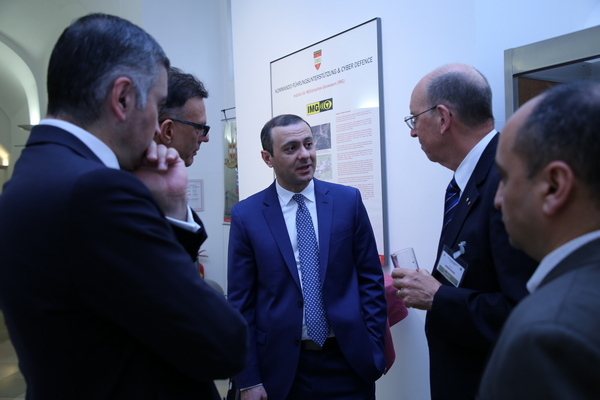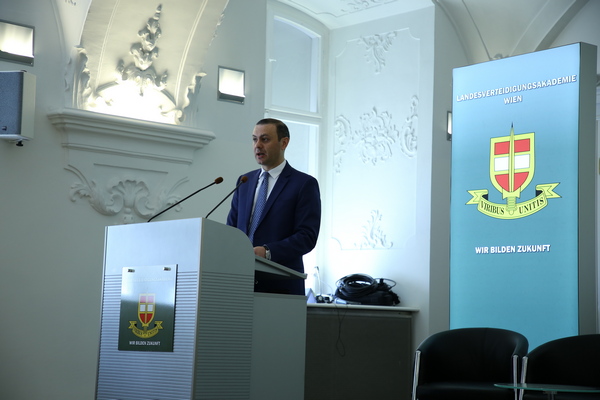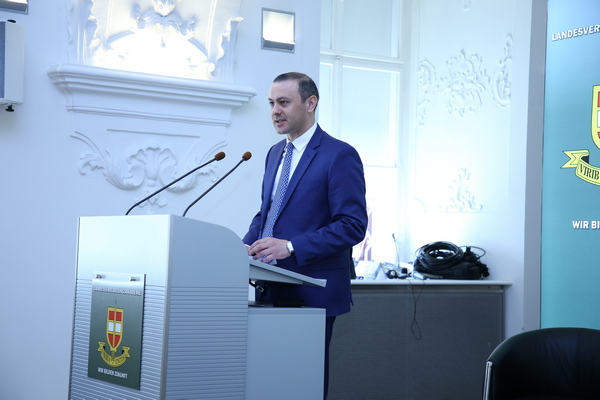
The speech of the SC secretary at the “4th Vienna Strategic Conference”
28 / 06 / 2019
Today, the Secretary of the Security Council Mr. Armen Grigoryan delivered a speech in Vienna within the framework of the 4th “Vienna Strategic Conference” organized by the Austrian National Defense Academy.
The lecture was followed by discussion, questions and answers.
The full version of the lecture is presented below.
A History", where the author has tried to show how the strategy has become a dominant part of our lives.
“Generally, history of humanity is a story of success and failure of strategies. A vivid example of the latter is the "Strategy" by Laurence Friedman, where the author tried to show how the strategy has become a dominant part of our lives.
This Academy and this Conference are also the result of strategic thinking - a successful strategic thinking I would say.
In my opinion, successful are those societies or individuals who have strategic thinking, since only this form of thinking lets the phenomena be viewed as comprehensive, and long-term, as well as make effective decisions. Moreover, there have been not many changes in the form of strategic thinking since the times of Thucydides, Sun Tzu, Jomini, Alfred Mahan and Julian Corbett. Despite the fact that since then massive revolutions have taken place in social and economic life of mankind, nevertheless, the mechanism of strategic thinking has not changed.
Interestingly, the military aspect of the strategic thinking is also applicable in other areas. For instance, Clausewitz’s ideas concerning the strategy of warfare have abandoned the narrow context of warfare and have widely been applied in non-military spheres, thus forming strategic way of thinking in various spheres of state and public activity. This is a way of thinking that has a definite goal and pursues a vision. It allows one to analyze theory and reality and achieve any goal against the backdrop of rapid development of technologies.
Interestingly, the military aspect of the strategic thinking is also applicable in other areas.
For instance, the ideas of Clausewitz concerning war strategy have abandoned the narrow context of warfare and have widely been applied in non-military shperes, thus forming strategic way of thinking in various spheres of state and public activity. This is a way of thinking that has a definite goal and pursues a vision. It allows one to analyze theory and reality and achieve any goal against the backdrop of rapid development of technologies.
Today, though strategy is perceived as separate scientific field, it is defined as art in the same way as politics. In other words, strategy bridges the gap between military and political goals. Consequently, strategy can be defined as an interconnected and mutually influential system of goals, the necessary means to achieve those goals as well as ways of effective use of those means.
In a broader sense, strategy involves ways of solving complicated problems in the sphere of national policy where political, economic, military as well as moral-psychological factors are of paramount importance. In this connection it is to the point to mention Clausewitz’s well known trinity _ the triangle of Nation, Army and Government, in which any strategy is doomed to fail unless the continuity and balance among the three sides are established. To Clausewitz's triad, I would add one more component - the economy. Today, any politician with a strategic mindset should be able to synchronize these four components. Any strategy is doomed to failure, if that strategic thinking is not shared by a wide circle of supporters in society. This is an important factor for any democratic government today.
Strategic thinking is of paramount importance for the security of the statehood, its effective governance and development, for only through the mastery of the art of strategy and strategic thinking it is possible to work out and realize a program of state development tailored to the promotion of security and progress.
Thus, strategy proves to be methodology of mentality which aim is to analyze and decode events, classify priorities and afterwards select the best way of realizing the vision at the core of which is the individual, the citizen.
Very often the nation’s interest is security itself, the preservation of which has become particularly difficult because of today’s hybrid threats. In the age of modern Information Technologies, security challenges have acquired new forms and content, presenting themselves as informational, psychological, economic and other threats. For promotion of inter-action of the above-mentioned components of security, as well as inter-connection of national and global systems the role of political leadership acquires key importance as the strategic way of thinking of the latter must pursue security driven policy.
After the revolution in Armenia the new authorities, which came to power, do not perceive the nature of security purely in military context. Contemporary security concept is observed in more expanded context in which the role of the Security Council is crucial.
The peculiarity of this body, first and foremost, is characterized by its structure, as well as by performing collegial activity.
Acting as a constitutional body, the Security Council of the Republic of Armenia, defines the main directions of defense policy, adopts decisions deriving from them, therefore functioning as an elaborating and coordinating body of State's Security Strategy.
In this connection we have undertaken the preparation of the new National Security Strategy of the Republic of Armenia coordinated by the Security Council. One of the components of this project is the definition of the security strategy goals and objectives because the strategic goals are the desired results we want to gain and strategy is the synchronization of ways and means which should be applied.
The axis of the process of working out National Security Strategy is the evaluation of the security environment. In this connection the geo-political role of the Caucasus is truly unique. Due to its geographical position, the Caucasian region is a bridge between the Black and Caspian Seas, between North and South, East and West. The geopolitics of the Southern Caucasus is to be seen not only through the prism of global-philosophical dimension but in the context of Civilizations as well. That is the reason why the Caucasus is the center of the interest of superpowers, the main focus of their relations.
Within the above-mentioned context taking into consideration the multi-vector competition among the great powers, the geopolitics of the regional powers, the correlation of power of the Southern Caucasus countries, being literally in the center of the “New Big Game” and at the same time being part of this game, capped by ethnic, cultural, geographical and other differences and disagreements among the big and small countries, the policy of the Southern Caucasus countries is formulated around an important concept - national interest, which is security in its wider sense of application. And it is in this context that strategic thinking gains prominence in terms of helping us make effective decisions in complex and uncertain situations.
Today, security includes political, military, economic, cultural, technological components that interact with one another. But the fact of their inter-connection does not abolish the challenges to international security and peace. This is conditioned by the fact that any state’s security is directly connected with the stability of the regional subsystem which in its turn is connected with the international system. Consequently processes of globalization, along with the development and modernization of communication technologies, have formed a basis of new, non - traditional threats to security.
International cooperation is considered by us to be of particular importance in struggle against hybrid threats. Balanced policy is an important guarantee of peace for Armenia. Having strategic ties with Russia and being a member of the Eurasian Union, in 2017 Armenia signed the Comprehensive and Enhanced Partnership Agreement, thus becoming a link between East and West. Armenia’s military-political cooperation with the NATO is realized within this context too, as Armenia is a member of the CSTO. Thus, Armenia pursues balanced foreign policy strategy in all directions, and it has good relations with all the important centers.
Recent Scientific progress in various spheres also has a real potential to influence security. The Internet and digital technologies have created a new dimension in the sphere of security and cyber-wars. Cyber threats are the mirror of the modern world as they reflect the international, complex and contemporary nature of the world. The problem of promoting security is growing more complex, more extended and more destructive. One of the problems in the security of cyber environment is the fact that any individual from any place can act. This fact increases vulnerability leading to serious consequences. Within this context we consider it important to mention that the preparation of the of Cyber-Security strategy is under way. It is being worked out according to the logic of the National Security Strategy.
Thus, strategic way of thinking meant to promote security is not limited to the narrow military sphere. Under the circumstances promotion of national security is rather a complex, multi-level and multi-layer problem that requires professional approaches at national and international levels with precise consideration of all the aspects of those multiple factors and multi-layered problems. And any strategy of defense planning can be carried out if it is based on public will-power and enjoys wide public support.
